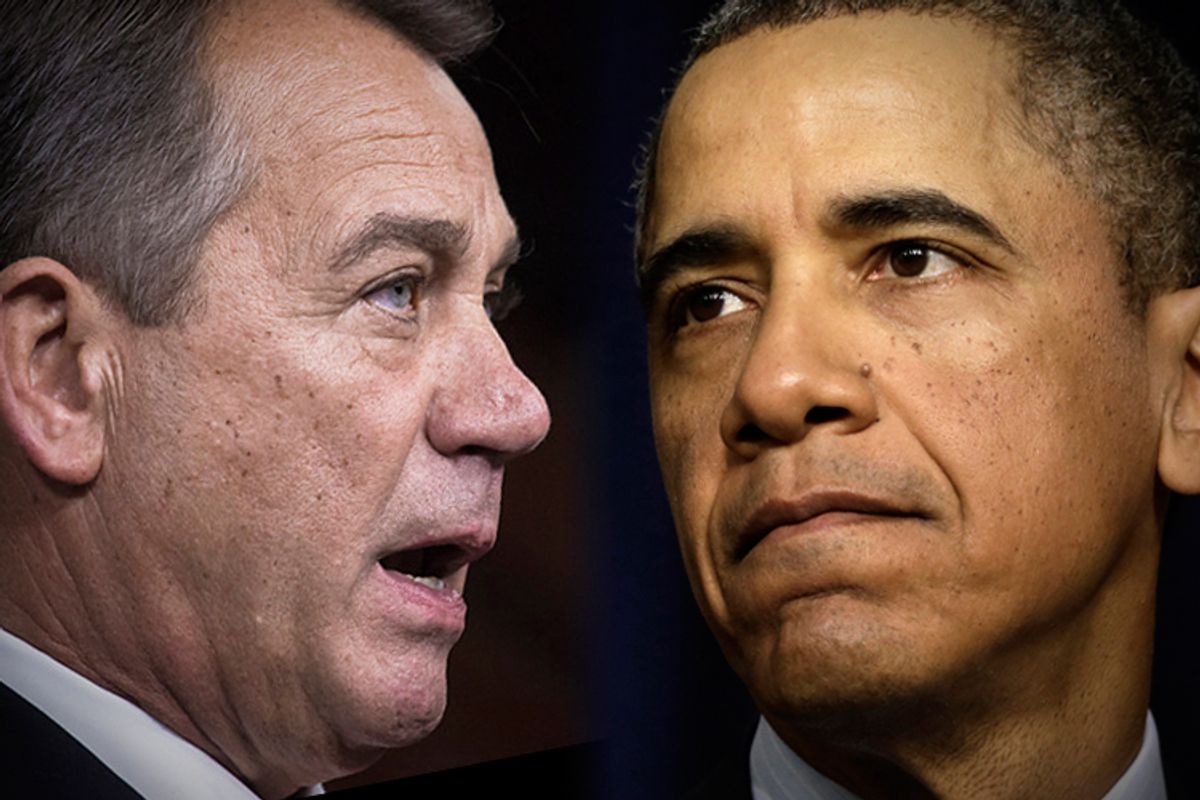It is hilarious how much the centrist deficit-hawk Grand Bargain cheerleaders detest Obama and blame him for his failure to get a Grand Bargain, because he often seems like the only person in Washington who legitimately, sincerely wants one.
So Barack Obama did his "charm offensive" -- he spoke, in real life, to Republican members of Congress -- and everyone agreed that it didn't count because he didn't mean it. Reaching out to people in order to attempt to persuade them to support a policy goal only counts if you sincerely want to speak to those people, everyone knows that.
The problem isn't actually that Barack Obama was insufficiently charming. The problem is much more simple: He is campaigning for policies Republicans don't support. Barack Obama wants to cut the deficit. Republicans don't care about the deficit. Barack Obama wants to cut the deficit by raising more revenue and cutting social insurance programs. Republicans hate taxes and don't actually want to cut social insurance programs for old people. So, "charm" is not really the problem.
Here's Mike Allen and Jim VandeHei today, explaining the Grand Bargain bargaining dynamic:
As for the grand bargain, which could always happen if lightning strikes in these meetings and common ground emerges, the trade-off has always been simple and clear: Republicans swallow tax increases; Democrats swallow an equal amount of entitlement cuts.
And here they are two paragraphs later explaining why that "simple and clear" trade-off actually doesn't at all explain the current impasse:
Sen. Lindsey Graham (R-S.C.) says he can envision such a scenario if Democrats put specific entitlement cuts on the table. But, top House GOP officials tell us that is nuts. The prevailing view among House Republicans is that they have finally won the cuts they spent years fighting for and see little reason to tick off senior voters by cutting entitlements while also ticking off the base with new taxes. In truth, many Republicans aren’t very motivated themselves to start messing with entitlements if they don’t have to.
Except in the case of exciting new wars or national security emergencies, members of Congress generally prefer whatever the status quo is to voting for stuff. Senators often would rather block votes on things they claim to support than actually stick their necks out and pass legislation that people might not like. So it is perfectly natural that no one wants a Grand Bargain even though some of them say they want a Grand Bargain, because saying you want one is usually met with approval from the press.
But the best explanation for the current debate in Washington isn't that there is a breakdown happening due to a lack of face-to-face negotiations, or even that Republicans refuse to accept tax hikes in exchange for the entitlement cuts they want. The most likely explanation, as Kevin Drum points out, is that Republicans just don't want any part of a Grand Bargain. Barack Obama is probably sincere in his desire for one. Republicans aren't.
(And the best way for Republicans who suspect the president isn't sincere in his attempts to find common ground with them to "call his bluff" would be to reach a compromise and see if he signs it into law. That would be informative, for all of us.) (But actually don't do that because it'd be a terrible deal probably.)
Meanwhile, the president is also trying to "charm" Democrats in Congress into accepting his Social Security and Medicare cuts. This is an easier sell, because Senate Democrats are more conservative than House Republicans are liberal, but as Alex Seitz-Wald wrote earlier, many Democrats don't really understand why they should come out in favor of program cuts when Republicans feel no need to stick their necks out on anything, at all, because they don't actually care about or want a Grand Bargain.
In other words, intransigent House Republicans are going to save Social Security, by refusing to agree to a Grand Bargain. (At least until Republicans eventually retake all of Congress and the White House and try to privatize it again.)



Shares